
Lawrence Welk was an American musician, accordionist, bandleader, and television impresario, who hosted the television program The Lawrence Welk Show from 1951 to 1982. His style came to be known to his large audience of radio, television, and live-performance fans as "champagne music".
The Chantays, sometimes credited as Chantay's, is an American surf rock band from Orange County, California, United States, known for the hit instrumental "Pipeline" (1963). Their music combines electronic keyboards and surf guitar, creating a unique ghostly sound.
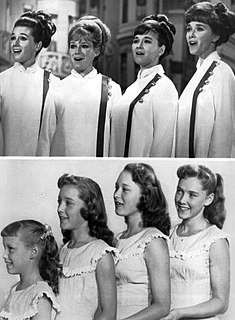
The Lennon Sisters are an American vocal group initially made up of four sisters from a family that had seven sisters in all and five brothers. The original quartet consisted of Dianne, Peggy, Kathy, and Janet. All 12 Lennon children were born in Los Angeles, California.
"Baby Elephant Walk" is a song written in 1961 by Henry Mancini for the 1962 film Hatari! In 1963, the song earned Mancini a Grammy Award for Best Instrumental Arrangement.
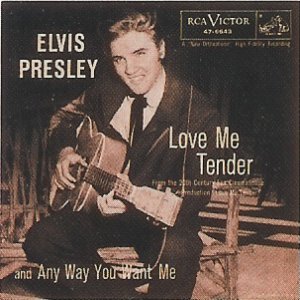
"Love Me Tender" is a 1956 song recorded by Elvis Presley and published by Elvis Presley Music from the 20th Century Fox film of the same name. The words are credited to Ken Darby under the pseudonym "Vera Matson", the name of his wife, and Elvis Presley. The RCA Victor recording by Elvis Presley was no. 1 on both the Billboard and Cashbox charts in 1956. The song was adapted from the melody for "Aura Lee", a sentimental Civil War ballad. The song is also featured in many other films and television shows such as FM, Touched By Love, This is Elvis, Porky's Revenge, Wild at Heart, Die Hard 2, Honeymoon in Vegas, Backbeat, Gaudi Afternoon, Machine Gun Molly, The Princess Diaries 2: Royal Engagement, William Eggleston in the Real World, California Dreamin', Love in Space, Masters of Sex, Devil's Due, Just Before I Go,90 Minutes in Heaven, and Ready or Not.

"You Don't Know Me" is a song written by Cindy Walker based on a title and storyline given to her by Eddy Arnold in 1955. "You Don't Know Me" was first recorded by Arnold that year and released as a single on April 21, 1956 on RCA Victor. The best-selling version of the song is by Ray Charles, who took it to number 2 on the Billboard Hot 100 chart in 1962, after releasing the song on his number 1 album Modern Sounds in Country and Western Music. The first version of the song to make the Billboard charts was by Jerry Vale in 1956, peaking at number 14 on the pop chart. Arnold's version charted two months later, released as an RCA Victor single, 47-6502, backed with "The Rockin' Mockin' Bird", which reached number 10 on the Billboard country chart. Cash Box magazine, which combined all best-selling versions at one position, included a version by Carmen McRae that never appeared in the Billboard Top 100 Sides listing.

"I Can't Stop Loving You" is a popular song written and composed by country singer, songwriter, and musician Don Gibson, who first recorded it on December 30, 1957, for RCA Victor Records. It was released in 1958 as the B-side of "Oh, Lonesome Me", becoming a double-sided country hit single. At the time of Gibson's death in 2003, the song had been recorded by more than 700 artists.

"Runaway" is a number-one Billboard Hot 100 song made famous by Del Shannon in 1961. It was written by Shannon and keyboardist Max Crook, and became a major international hit. It is No. 472 on Rolling Stone's list of the 500 Greatest Songs of All Time, compiled in 2010.
"On the Street Where You Live" is a song with music by Frederick Loewe and lyrics by Alan Jay Lerner from the 1956 Broadway musical My Fair Lady. It is sung in the musical by the character Freddy Eynsford-Hill, who was portrayed by John Michael King in the original production. In the 1964 film version, it was sung by Bill Shirley, dubbing for actor Jeremy Brett.
"Para Vigo me voy", known in English as "Say Si Si", is a popular song written in 1935 by Cuban composer Ernesto Lecuona with lyrics by Francia Luban and Al Stillman. Early bands to record the song include Xavier Cugat's orchestra (1935) and Lecuona Cuban Boys (1937). The song was copyrighted in the United States in 1940. It became a hit in the US when it was recorded by The Andrews Sisters and Glenn Miller in 1940, and The Mills Brothers in 1953.
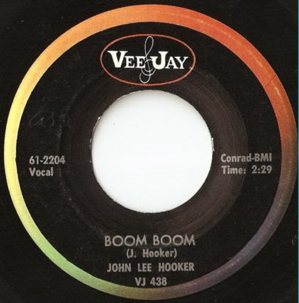
"Boom Boom" is a song written by American blues singer and guitarist John Lee Hooker and recorded in 1961. Although it became a blues standard, music critic Charles Shaar Murray calls it "the greatest pop song he ever wrote". "Boom Boom" was both an American R&B and pop chart success in 1962 and a UK top-twenty hit in 1992.
"Last Date" is a 1960 instrumental written and performed by Floyd Cramer. It exemplifies the "slip note" style of piano playing that Cramer made popular. It peaked at number 11 on the country chart and at number two on the Hot 100 behind "Are You Lonesome Tonight?" by Elvis Presley. Cramer's recording inspired a number of successful cover versions, including a vocal adaptation by Conway Twitty.

"You Don't Love Me" is a rhythm and blues-influenced blues song recorded by American musician Willie Cobbs in 1960. Adapted from Bo Diddley's 1955 song "She's Fine She's Mine", it is Cobbs' best-known song and features a guitar figure and melody that has appealed to musicians in several genres.
"What Will Mary Say" is a song written by Eddie Snyder and Paul Vance and performed by Johnny Mathis. It reached #3 on the adult contemporary chart, #9 on the U.S. pop chart, #21 on the U.S. R&B chart, and #49 on the UK Singles Chart in 1963.

Hatari! Music from the Paramount Motion Picture Score is the soundtrack from the 1962 movie Hatari! starring John Wayne. The music was composed and conducted by Henry Mancini. It included the hit single "Baby Elephant Walk". It entered Billboard magazine's pop album chart on July 28, 1962, peaked at No. 4, and remained on the chart for 35 weeks. AllMusic gave the album a rating of two-and-a-half stars. Reviewer Ted Mills called it "a fun blend of jazz and Afro-exotica, jungle drums mixed with a classic bop combo."
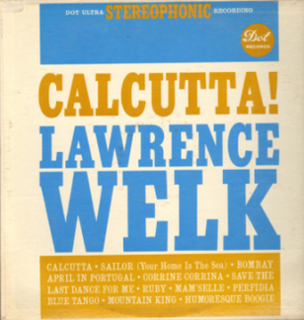
Calcutta! is an album by Lawrence Welk and His Orchestra. It was released in 1961 on the Dot label. The album featured Frank Scott at the harpsichord and included Welk's No. 1 hit single, "Calcutta".

Moon River is an album by Lawrence Welk and His Orchestra. It was released in 1961 on the Dot label.
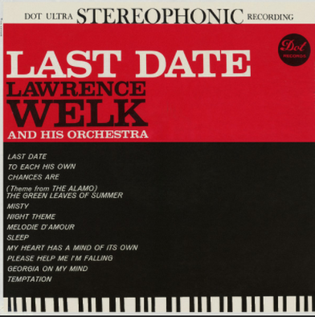
Last Date is an album by Lawrence Welk and His Orchestra. It was released in 1960 on the Dot label.
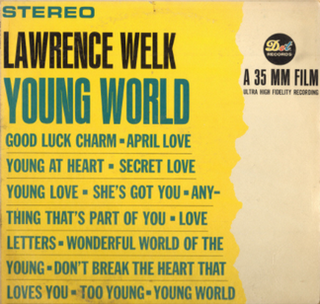
Young World is an album by Lawrence Welk and His Orchestra. It was released in 1962 on the Dot label. The album debuted on Billboard magazine's popular albums chart on June 9, 1962, reached the No. 6 spot, and remained on that chart for 12 weeks

Lawrence Welk and His Sparkling Strings is an album by Lawrence Welk and His Sparkling Strings. It was released in 1955 on the Coral label. The album debuted on Billboard magazine's popular albums chart on January 28, 1956, reached the No. 5 spot, and remained on that chart for 11 weeks














